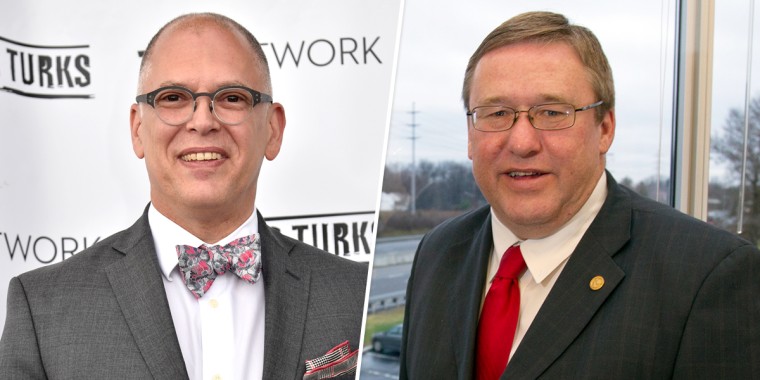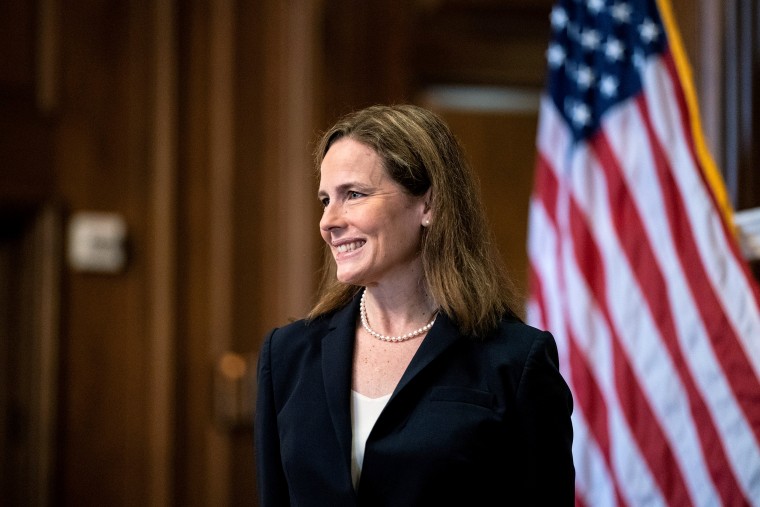Jim Obergefell and Rick Hodges, the two men whose names appeared opposite each another in the landmark 2015 Supreme Court case that led to nationwide marriage equality, have joined forces to oppose the nomination of Judge Amy Coney Barrett to the high court.
“We ask the Senate to vote no on this nomination,” Obergefell said during a livestreamed press conference Tuesday. “Judge Barrett's well-known stances on marriage equality, trans equality and other issues represent a serious risk to our civil rights and our ability to form and protect our families.”
Obergefell and Hodges were joined by Democratic Sens. Sherrod Brown of Ohio, Patty Murray of Washington and Ron Wyden of Oregon. The event, organized by the civil rights organization Family Equality, highlighted concerns among LGBTQ advocates about Barrett’s track record on such issues, including her questioning of the court’s Obergefell v. Hodges ruling and her defense of the justices who dissented in the case.

Justices Samuel Alito and Clarence Thomas, two of the case’s four dissenters, again criticized that ruling earlier this month when the high court decided not to hear a case brought by Kim Davis, a former Kentucky county clerk who refused to issue marriage licenses to same-sex couples.
During Tuesday’s livestream, Obergefell noted that Justice Ruth Bader Ginsburg, whose seat Barrett is up for, “famously advocated for full milk marriage rather than skim milk marriage for same-sex couples, with all of the attending rights and responsibilities; nothing short of full equality for all was acceptable to her.”
“I can't stress enough how important I believe it is that the two opposing sides of such a momentous ruling can stand together as friends and defend the LGBTQ+ communities,” Obergefell added. “Rick and I stand here today together to support that vision of full equality.”
Hodges, the former director of the Ohio Department of Health, said he fears what is at stake with Barrett’s nomination is that “all Americans are treated with full dignity and respect regardless of who they are or whom they love, and that all American families benefit equally full and fully from government services.”
“They pay for it through their taxes,” he added.
Murray expressed concern that while Barrett was willing to say during her Senate confirmation hearing last week that she thought Brown v. Board of Education, which desegregated public schools, and Loving v. Virginia, in which the court ruled in favor of interracial marriages, were decided correctly, she would not say whether or not she agreed with the ruling in Obergefell v. Hodges.
“It is shocking and deeply concerning that she refused to affirm the constitutionality of thousands and thousands of marriages across the country,” Murray said. “Her silence made clear that if confirmed to the Supreme Court, and if Republicans succeed in their single-minded efforts to shift the court rightward, thousands of LGBTQIA+ lives could be upended.”
Wyden cautioned that “many core fundamental rights are at stake,” adding, “We can't turn back the clock.”
Brown did not rule out the possibility of adding more justices to the Supreme Court, a move often referred to as “court packing,” arguing Senate Majority Leader Mitch McConnell “has already packed the courts.”
“He’s packed the courts with young, far-right, anti-labor rights, anti-civil rights, anti-gay rights judges for four years,” Brown said.
“Depending on what happens — what happens to the ACA, what happens to Roe v. Wade, what happens to marriage equality — all things are on the table,” he said referring to the Affordable Care Act and the landmark ruling that established a woman's right to abortion.


